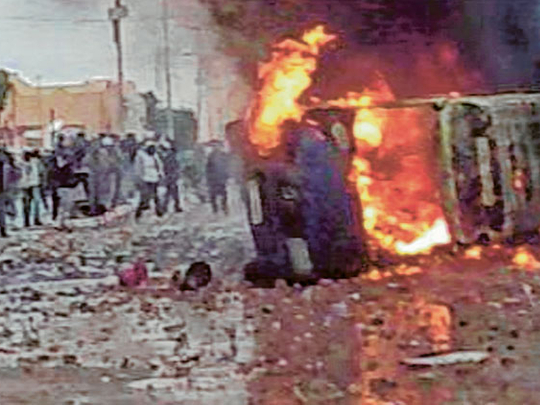
Tunis: One man was killed in clashes with police in the Tunisian capital overnight, witnesses said, after crowds defied a curfew aimed at bringing a halt to the north African country's worst unrest in decades.
In the provincial town of Sidi Bouzid, where the unrest started nearly a month ago, witnesses said several thousand people had marched through the streets chanting anti-government slogans.
Central Tunis appeared to have been spared any further clashes overnight and life appeared to be returning to normal there, France-Info radio reported, a day after tear gas and stone-throwing youth reached the government's doorstep for the first time. Police have repeatedly opened fire on protesters.
Shattered image
Demonstrators defying autocratic President Zine Al Abidine Ben Ali have set off clashes with police as protests spread around the country, leaving at least 50 dead and shattering Tunisia's image as an island of calm in volatile North Africa.
One of those killed was a professor of computer science in France, at the University of Technology at Compiegne. University spokeswoman Nadine Luft said Hatem Bettahar had taught there for a decade.
Bettahar had gone to vacation in Tunisia to see his mother, she said. The school board, meeting yesterday, observed a moment of silence for Bettahar, who was a French citizen, she said.
Slah Nebti, a Tunisian teacher, said Bettahar was shot to death by police in a protest in the central city of Douz.
He filmed a video of the shooting's aftermath and posted it to Facebook: It showed Bettahar lying in a pool of blood, and the crowd shouting "God is Great!" in Arabic. Ben Ali, 74, has maintained an iron grip on Tunisia since grabbing power 23 years ago in a bloodless coup, repressing any challenge to a government many see as corrupt and intolerant.
The image of stability and religious moderation helps draw millions of mostly European visitors a year to the Mediterranean beaches of this small North African nation, making tourism the mainstay of the economy.
But Ben Ali's tight control has also created the simmering sense of anger and resentment that erupted in the capital and outside it.












